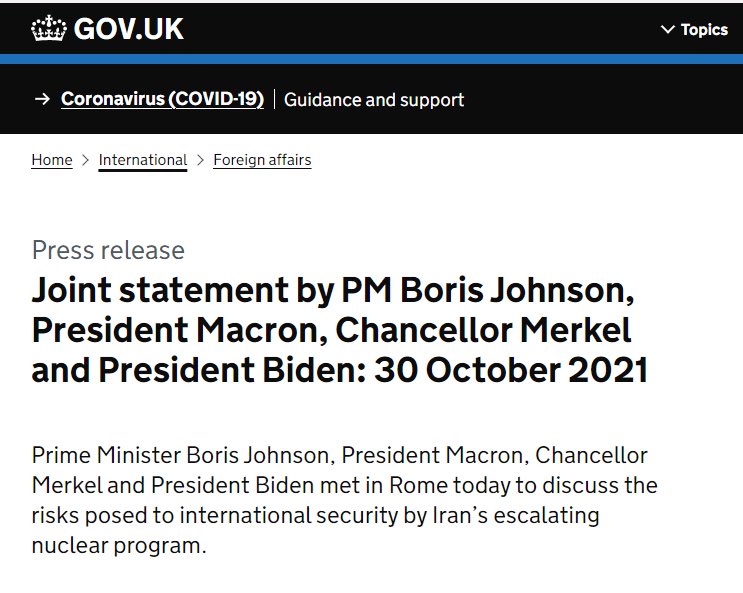
162 days after they last recessed, JCPOA negotiations resume in Vienna tomorrow.
It's fair to say they are not burdened by the weight of excessive optimism.
A breakdown of what's changed since June, what hasn't, and what to watch [Thread]



It's fair to say they are not burdened by the weight of excessive optimism.
A breakdown of what's changed since June, what hasn't, and what to watch [Thread]




2/ Let's start with one big thing that's changed: Iran's government.
Raisi administration is far more conservative in nature, and far less convinced of the merits of engaging the West, than its predecessor. The views of its negotiating team range from JCPOA sceptics to critics.
Raisi administration is far more conservative in nature, and far less convinced of the merits of engaging the West, than its predecessor. The views of its negotiating team range from JCPOA sceptics to critics.

3/ Iran's nuclear program has continued expanding: Breakout is now estimated at a month, stockpiles at 20 and 60% growing, concern over irreversible knowledge gains deepening and international monitoring/verification hampered by lack of cooperation with IAEA.
4/ Now, absence of negotiations since June does not mean absence of talks. Discussions between the U.S. and P4+1, between Iran and the P4+1, among the P4+1, between the U.S./E3 and regional stakeholders have been constant, especially in past few weeks. 







5/ And even as coordinating positions ahead of Vienna talks, greater chatter on fall back options if they stall: Action at an extraordinary BoG session, more concerted/unified Western pressure, speculation on military options, interim deals, etc.
6/ But on this point, an important note to underscore: Discussing Plan B options does not mean Plan A - success in Vienna - is not the preferred objective.
Every official we've spoken to acknowledged challenges ahead, but also the high stakes and serious risks of stalemate.
Every official we've spoken to acknowledged challenges ahead, but also the high stakes and serious risks of stalemate.
7/ As far as specifics, the three issues that were under discussion in previous 6 rounds are - or should be - at the heart of what Vienna talks need to tackle: Sanctions, nuclear, and sequencing. None of these can be fully addressed in isolation from the others.
8/ And while the Raisi government has put great emphasis on its ability to nurse Iran's economy even in the absence of sanctions relief, that's optimism verging on fantasy. Even the expansion of economic ties with neighbours has a hard ceiling if JCPOA collapses. 

9/ Another thing that hasn't changed is Iranian insistence that talks w/ U.S. be conducted indirectly via P4+1. I've said it before and I'll say it again: This is an utterly unconstructive position adding avoidable burden of time and layer of complication to proceedings.
10/ Indeed, combination of long hiatus, nuclear advances & inconclusive IAEA talks means the clock - already ticking between Apr-Jun - is all the more of a factor now. Foot-dragging or logjams were serious then, and are very much a concern now: something P4+1 seem to agree on. 

11/ To put it simply, what we'll start to get a sense of tomorrow is whether the new Iranian team approaching it as the 7th round of previous talks, or the 1st round of new ones.
The former means looking for ways to bridge gaps that had already been narrowed considerably.
The former means looking for ways to bridge gaps that had already been narrowed considerably.
12/12 The latter portends a far more difficult proposition that jettisons past progress, introduces new demands, injects new uncertainties and spells an altogether more sobering picture going into the new year.
• • •
Missing some Tweet in this thread? You can try to
force a refresh





